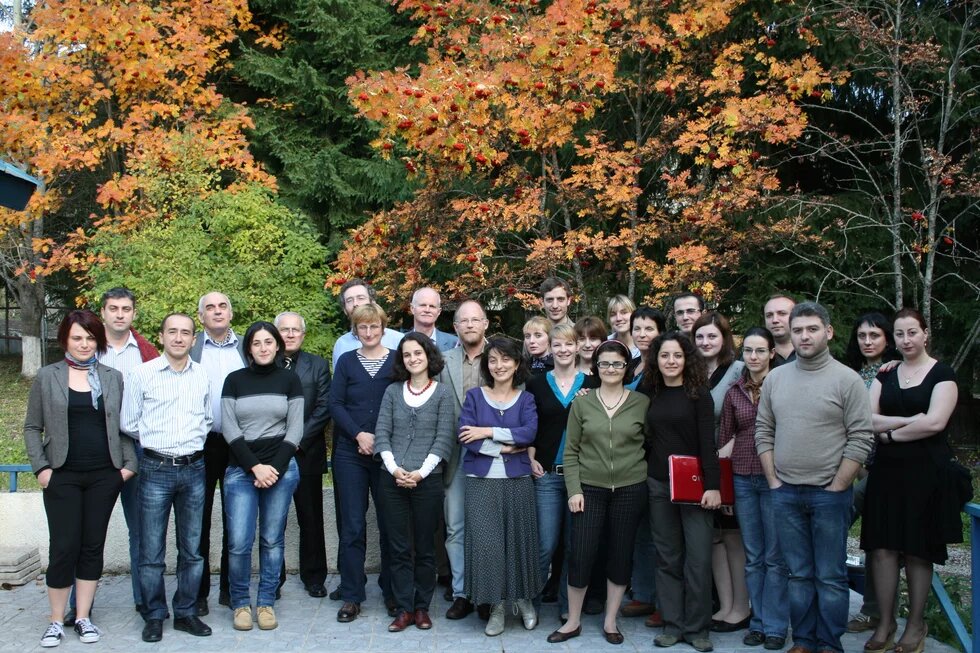
by Dr. Wim van Meurs
The one-week summer school brought together twenty young researchers and NGO staffers from the South Caucasus and ten experts in the field of post-communist transformation, national identity, conflict management, state building and Europeanization. The organizers were Iris Kempe and Nino Lejava on behalf of Heinrich Böll Foundation and Tobias Debiel and Corinne Heaven on behalf of the Institute for Development and Peace.
The twenty participants had been selected out of fifty respondents to the call on the basis of the quality and relevance of their research project for the main themes of the summer school. The group of participants came from Georgia, Azerbaijan and Armenia, including a number of researchers currently holding a Heinrich Böll scholarship and represented a wide variety of disciplines, ranging from political science and cultural studies to European studies and anthropology. The experts came from the region as well as from Germany, Russia and the Netherlands. The key objective of the summer school was to bring together empirical findings and fieldwork in the societies and politics of the South Caucasus with broader theoretical frameworks and comparable research from other regions.
The programme of the summer school included roundtables and plenary sessions with lectures on methodology or major research issues as well as smaller working groups with presentations by the participants and feedback on their research projects. In addition, a pan-European culinary dinner on the opening day of the summer school, a “hat at the campfire, a movie and an excursion to Borjomi-Kharagauli National Park all provided the much-needed leisure after days of intensive debate and listening.
The experts used the roundtables and plenary sessions to raise methodological issues that included not only reflections on for instance the politicisation of research in the political/social sciences and humanities, but also overviews of the state-of-the-art in international theory-building on topics such as democratization, conflict management or Europeanization. As an important more practical contribution, they presented the set-up and implementation of their own research projects, e.g. on the analysis of national identities in school textbooks or the analysis of factors determining intra-state conflicts. Overall, the plenary sessions offered both in-depth discussions on the South Caucasus region and the stimulating introduction of outside comparisons, e.g. to post-communist transition in Eastern Europe, secessionist conflicts in Cyprus or Moldova, national identification in the Baltic states as well as democratization in Poland and Central Asia.
The working groups gave everyone of the twenty participants one and a half hours for a thorough discussion of empirical, methodological and theoretical aspects of his or her research endeavour. Nevertheless, more often than not time was too short for all questions, methodological critique, theoretical queries and suggestions for additional reading or new angles to the topic. Generally speaking, the on-going research projects were solid on the methodology and implementation of the empirical studies and fieldwork, offered interesting insights in actual developments and dispositions of the respective societies, especially for the experts from outside of the region. Correspondingly, the experts were able to give valuable advice to the young researchers in respect to the relevant international literature on their topic, the availability of comparable studies for other regions as well as suggestions for further theoretical underpinning of the project. The projects discussed indeed covered a wide variety of topics, ranging from an analysis of history textbooks from Georgia and Armenia to a study of the foreign policy of non-recognized entities; from an interview-based study of migrant women and their motives to the Europeanisation of the states of the South Caucasus; from homosexuality in Tbilisi to artisans’ markets in Yerevan. Overall, a majority of the projects was focused on either consequences of regional conflicts (e.g. migration, IDPs) or conflict-resolution strategies (e.g. youth dialogue, national identity) or socio-economic problems (e.g. labour markets, education) or Europeanisation (e.g. European Neighbourhood Policy, democratization). Evidently many of the projects touched upon more than one of these four aspects such as Europe’s role in conflict resolution. Consequently, many links between individual projects became apparent in the discussions, in terms of source material, methodology or theoretical framework.
After five days, thirty individuals set out to travel back to their hometowns as far apart as Duisburg and Baku, but knowing that a new research network had been created and that the new contacts and ideas would propel their personal projects and hopefully also long-term visions of peaceful development and Europeanization in the region of the South Caucasus.